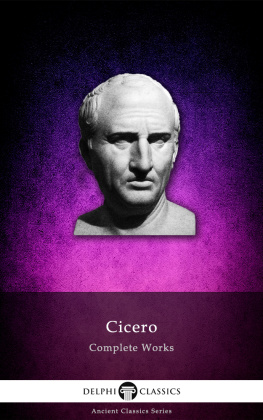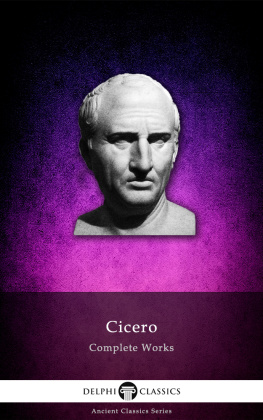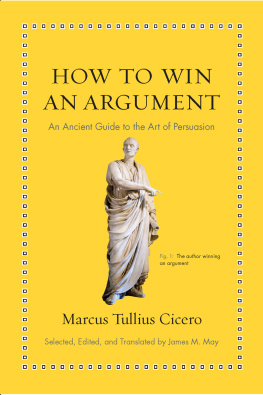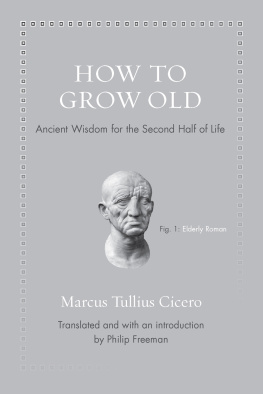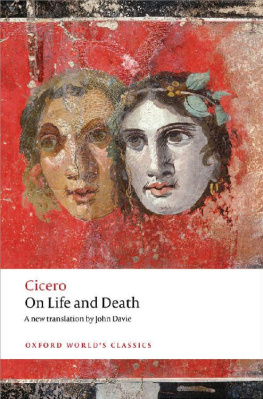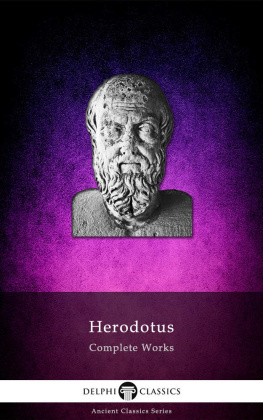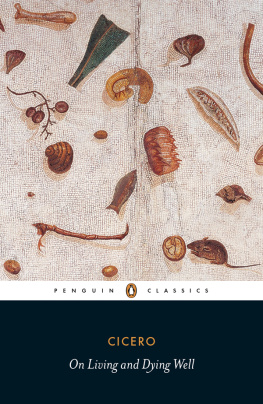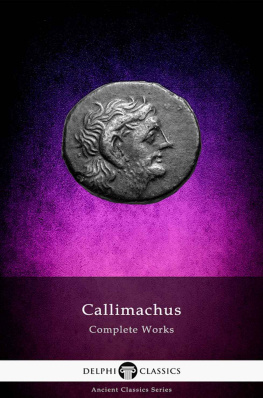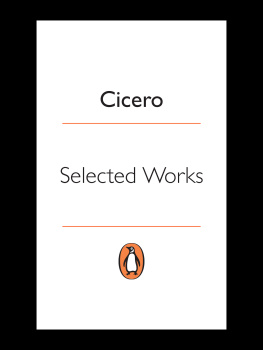Marcus Tullius Cicero - Delphi Complete Works of Cicero (Illustrated) (Delphi Ancient Classics Book 23)
Here you can read online Marcus Tullius Cicero - Delphi Complete Works of Cicero (Illustrated) (Delphi Ancient Classics Book 23) full text of the book (entire story) in english for free. Download pdf and epub, get meaning, cover and reviews about this ebook. year: 2014, publisher: Delphi Classics, genre: Science. Description of the work, (preface) as well as reviews are available. Best literature library LitArk.com created for fans of good reading and offers a wide selection of genres:
Romance novel
Science fiction
Adventure
Detective
Science
History
Home and family
Prose
Art
Politics
Computer
Non-fiction
Religion
Business
Children
Humor
Choose a favorite category and find really read worthwhile books. Enjoy immersion in the world of imagination, feel the emotions of the characters or learn something new for yourself, make an fascinating discovery.
- Book:Delphi Complete Works of Cicero (Illustrated) (Delphi Ancient Classics Book 23)
- Author:
- Publisher:Delphi Classics
- Genre:
- Year:2014
- Rating:5 / 5
- Favourites:Add to favourites
- Your mark:
- 100
- 1
- 2
- 3
- 4
- 5
Delphi Complete Works of Cicero (Illustrated) (Delphi Ancient Classics Book 23): summary, description and annotation
We offer to read an annotation, description, summary or preface (depends on what the author of the book "Delphi Complete Works of Cicero (Illustrated) (Delphi Ancient Classics Book 23)" wrote himself). If you haven't found the necessary information about the book — write in the comments, we will try to find it.
Marcus Tullius Cicero: author's other books
Who wrote Delphi Complete Works of Cicero (Illustrated) (Delphi Ancient Classics Book 23)? Find out the surname, the name of the author of the book and a list of all author's works by series.
Delphi Complete Works of Cicero (Illustrated) (Delphi Ancient Classics Book 23) — read online for free the complete book (whole text) full work
Below is the text of the book, divided by pages. System saving the place of the last page read, allows you to conveniently read the book "Delphi Complete Works of Cicero (Illustrated) (Delphi Ancient Classics Book 23)" online for free, without having to search again every time where you left off. Put a bookmark, and you can go to the page where you finished reading at any time.
Font size:
Interval:
Bookmark:

The Complete Works of
CICERO
(106 BC43 BC)

Contents

Delphi Classics 2014
Version 1

The Complete Works of
MARCUS TULLIUS CICERO

By Delphi Classics, 2014

Cicero was born in Arpinum, a hill town 60 miles southeast of Rome in 106 BC. His father was a well-to-do member of the equestrian order and had good connections in Rome.

Translated by C. D. Yonge
Composed in 81 BC, the Pro Quinctio is one of Ciceros very first orations, which he delivered when he was twenty-five years, on behalf of Publius Quintius. The speech concerns Caius Quintius and Sextus Naevius, one of the public criers, who had been partners, co-owning their chief business in Gallia Narbonensis. When Caius died and left his brother Publius his heir, disputes arose between this relative and Naevius, concerning the division of the property of the partnership.

The Young Cicero Reading by Vincenzo Foppa, 1464

Victorian etching of a bust of Cicero
The speech of M. T. Cicero as the advocate of P. Quinctius.
The Argument
Caius Quinctius and Sextus Naevius, one of the public criers, had been partners, having their chief business in Gallia Narbonensis Caius died, and left his brother Publius his heir, between whom and Naevius there arose disputes concerning the division of the property of the partnership. Caius had left some debts, and Publius proposed to sell some lands which his brother had acquired as private property near Narbonne, for the purpose of liquidating them. Naevius interposed difficulties in the way of his doing so, and by various artifices tried to make it appear that Quinctius had forfeited his recognizances; which would have given a different complexion to the whole case, as to forfeit ones recognizances was a crime liable to the punishment of infamia at Rome. Cicero undertook the defence of Quinctius at the request of Roscius the actor Naeviuss cause was conducted by Hortensius, the greatest advocate at Rome. It is doubtful whether this really was the first cause in which Cicero was engaged, as many think that he himself speaks in this oration of having been concerned in other trials previously, and that the speech for Sextus Roscius was his first. Quinctius gained the verdict.
The two things which have the greatest influence in a state, namely, the greatest interest, and eloquence, are both making against us at the present moment; and while I am awed by the one, O Caius Aquillius, I am in fear of the other: I am somewhat awed, apprehending that the eloquence of Quinctius Hortensius may embarrass me in speaking; but I am in no slight fear lest the interest of Sextus Naevius may injure Publius Quinctius. [2] And yet it would not seem so disastrous for us that these things should exist in the highest degree in the other party, if they existed also to a moderate extent in us; but the fact is, that I, who have neither sufficient experience nor much ability, am brought into comparison with a most eloquent advocate; and that Publius Quinctius, who has but small influence, no riches, and few friends, is contending with a most influential adversary. [3] And, moreover, we have this additional disadvantage, that Marcus Junius, who has several times pleaded this cause before you, O Aquillius, a man practised in the conduct of other causes also, and much and frequently concerned in this particular one, is at this moment absent, being engaged on his new commission; and so they have had recourse to me, who, even if I had all other requisite qualifications in ever so high a degree, have certainly scarcely had time enough to be able to understand so important a business, having so many points of dispute involved in it [4] so that also, which has been used to be an assistance to me in other causes, is wanting to me in this one; for in proportion to my want of ability, have I endeavoured to make amends for that want by industry, and unless time and space be given to one, it cannot be seen how great his industry is. But the greater our disadvantages, O Caius Aquillius, are, with so much the more favourable a disposition ought you, and those who are your colleagues in this trial, to listen to our words, that the truth, though weakened by many disadvantages, may be at last reestablished by the equity of such men as you. [5] But if you, being the judge, shall appear to be no protection to a desolate and helpless condition against power and influence; if before this tribunal the cause is found to depend on interest, not on truth; then indeed there is nothing any longer holy and uncontaminated in the state no hope that the firmness and virtue of the judge may counterbalance the lowly condition of any one. But undoubtedly before you and your colleagues truth will prevail, or else, if it be driven from this place by power and influence, it will not be able to find any place where it can stand.
I do not say this, O Caius Aquillius, because I have any doubt of your own good faith and constancy, or because Publius Quinctius ought not to have the greatest hopes from those whom you have called in as your assessors, being, as they are, among the most eminent men in the state. [6] What then? In the first place, the magnitude of the danger causes a man the greatest fear, because he is staking all his fortunes on one trial; and while he is thinking of this, the recollection of your power does not occur to his mind less frequently than that of your justice; because all men whose lives are in anothers hand more frequently think of what he, in whose power and under whose dominion they are, can do, than of what he ought to do, [7] Secondly, Publius Quinctius has for his adversary, in name indeed, Sextus Naevius, but in reality, the most eloquent, the most gallant, the most accomplished men of our state, who are defending Sextus Naevius with one common zeal, and with all their power: if, indeed, defending means so to comply with the desire of another, that he may the more easily be able to overwhelm whomsoever he chooses by an unjust trial; [8] for what, O Caius Aquillius, can be mentioned or spoken of more unjust or more unworthy than this, that I who am defending the liberties, the fame, and fortunes of another should be compelled to open the cause, especially when Quintus Hortensius, who in this trial fills the part of the accuser, is to speak against me; a man to whom nature has given the greatest possible fluency and energy in speaking? Matters are so managed, that I, who ought rather to ward off the darts of our adversary and to heal the wounds he has inflicted, am compelled to do so now, even when the adversary has cast no dart; and that that time is given to them to attack us when the power of avoiding their attacks is to be taken from us; and if in any particular they should (as they are well prepared to do) cast any false accusation like a poisoned arrow at us, there will be no opportunity for applying a remedy. [9] That has happened through the injustice and wrong-doing of the praetor; first, because, contrary to universal custom, he has chosen that the trial as to honour or infamy should take place before the one concerning the fact; secondly, because he has so arranged this very trial, that the defendant is compelled to plead his cause before he has heard a word of the accusers; and this has been done because of the influence and power of those men who indulge the violence and covetousness of Sextus Naevius as eagerly as if their own property or honour were at stake, and who make experiment of their influence in such matters as this, in which the more weight they have through their virtue and nobility, the less they ought to make a parade of what influence they have. [10] Since Publius Quinctius, involved in and overwhelmed by such numerous and great difficulties, has taken refuge, O Caius Aquillius, in your good faith, in your truth, in your compassion; when, up to this time , owing to the might of his adversaries, no equal law could be found for him, no equal liberty of pleading, no just magistrate, when, through the greatest injustice, everything was unfavourable and hostile to him; he now prays and entreats you, O Caius Aquillius, and all of you who are present as assessors, to allow justice, which has been tossed about and agitated by many injuries, at length to find rest and a firm footing in this place. [11]
Next pageFont size:
Interval:
Bookmark:
Similar books «Delphi Complete Works of Cicero (Illustrated) (Delphi Ancient Classics Book 23)»
Look at similar books to Delphi Complete Works of Cicero (Illustrated) (Delphi Ancient Classics Book 23). We have selected literature similar in name and meaning in the hope of providing readers with more options to find new, interesting, not yet read works.
Discussion, reviews of the book Delphi Complete Works of Cicero (Illustrated) (Delphi Ancient Classics Book 23) and just readers' own opinions. Leave your comments, write what you think about the work, its meaning or the main characters. Specify what exactly you liked and what you didn't like, and why you think so.

